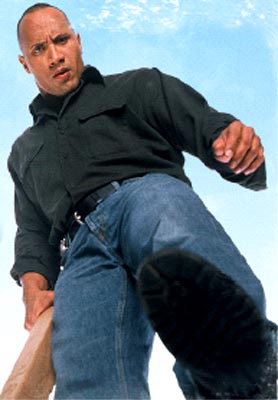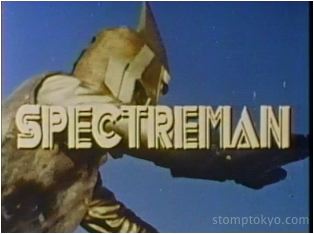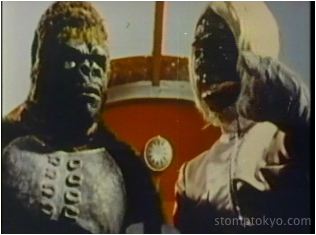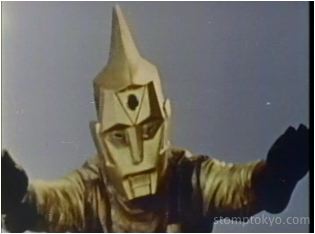Walking Tall
 If the audience at last night's sneak preview of Walking Tall was any indication, Dwayne "The Rock" Johnson's fan base is still intact, and the film's marketing people must have run a lot of commercials about the preview screening during this week's wrestling programs. The row in front of us was filled with grunting, hooting, joking lunkheads who did all of these things throughout the film. Far from detracting from the experience, however, it added an atmosphere of authenticity -- because that's exactly what was happening on screen as well.
If the audience at last night's sneak preview of Walking Tall was any indication, Dwayne "The Rock" Johnson's fan base is still intact, and the film's marketing people must have run a lot of commercials about the preview screening during this week's wrestling programs. The row in front of us was filled with grunting, hooting, joking lunkheads who did all of these things throughout the film. Far from detracting from the experience, however, it added an atmosphere of authenticity -- because that's exactly what was happening on screen as well.
The remake updates the story pretty closely (from what I can recall in my hazy memories of the original), introducing Johnson as Chris Vaughn, a former Special Forces soldier who returns home after eight years. To his surprise, the town mill has closed and his former girlfriend is working as a stripper in the community's new source of income, a garish casino run by a former classmate. The classmate (Neil McDonough) is more stereotype than character, but no one seemed to mind.
After a run-in with the casino security goons that nearly kills him, Vaughn decides that the casino is a Bad Thing. After breaking the law for most of the movie's first half, he does the only sensible thing: he runs for sheriff and wins. The movie takes off into pure fantasy as Vaughn fires the entire staff of deputies (including, apparently, the people who answer the phones) and relies on his buddy Johnny Knoxville to help out. I'm sure Knoxville's character had a name, but who cares? It's Johnny Knoxville. I know that at this point I should have been enjoying The Rock's one-man (OK, two-man) crusade to clean up the town, but I couldn't help marveling at how crime-free it was already, that a newly-elected sheriff could keep his job while ignoring all of the everyday business that had previously kept about a dozen people busy during the previous sheriff's tenure. Didn't anyone have anything else for which they needed a lawman?
Of course this isn't the point; I was supposed to be watching The Rock kick ass, and naturally the Rock kicks ass. The film goes to great lengths to even things up between the towering muscle mass that earned this man his wrestling moniker and his adversaries, but there can be no doubt of the outcome. That is just the way the lunkheads in the previous row liked it, and I couldn't help enjoying their enthusiasm. Knoxville adds an awful lot of entertainment value to scenes that need levity, particularly a scene involving a suspect and his beloved truck.
Scott and I were struck by the incredible lack of nudity in what is nominally an exploitation film, especially since the casino is supposed to be part strip-club. There are wet t-shirt contests that miss the point so entirely that Scott speculated there might have been some crafty editing or even the post-production "re-whitening" of the t-shirts. Janet Jackson, is this your doing?
 When I was in middle-school (or maybe early high school? -- the mid- to late-'80s at any rate), there was an afternoon block of kids' programming on the local independent TV station, Channel 69. (No, I'm not making this up. In fact,
When I was in middle-school (or maybe early high school? -- the mid- to late-'80s at any rate), there was an afternoon block of kids' programming on the local independent TV station, Channel 69. (No, I'm not making this up. In fact, 



